Roll over image to zoom in
Hunger Games Trilogy (classic boxed set)
£23.80
The original paperback trilogy in the Hunger Games series in a handy slipcase.
Set in a dark vision of the near future, a terrifying reality TV show is taking place.
Twelve boys and twelve girls are forced to appear in a live event called The Hunger Games.
There is only one rule: kill or be killed.
When sixteen-year-old Katniss Everdeen steps forward to take her younger sister’s place in the games, she sees it as a death sentence.
But Katniss has been close to death before. For her, survival is second nature.
- now a major feature film starring Jennifer Lawrence, Josh Hutcherson & Liam Hemsworth
- Ballad of Songbirds and Snakes is now available in parperback and tells the backstory of President Snow.
- Ballad of Songbirds and Snakes is coming out as a major feature film in November 2023
INCLUDED IN THE BOX SET
-
- The Hunger Games
- Catching Fire
- Mockingjay
*please note – the boxset cover may differ to the one in the image
Read more
Additional information
| Publisher | 1st edition (6 Sept. 2012), Scholastic |
|---|---|
| Language | English |
| Paperback | 1408 pages |
| ISBN-10 | 1407135449 |
| ISBN-13 | 978-1407135441 |
| Reading age | 11+ years, from customers |
| Dimensions | 13.9 x 8.9 x 20.4 cm |

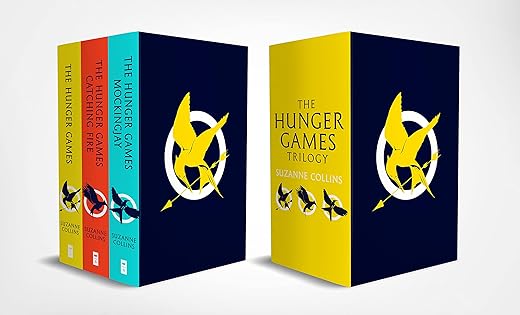
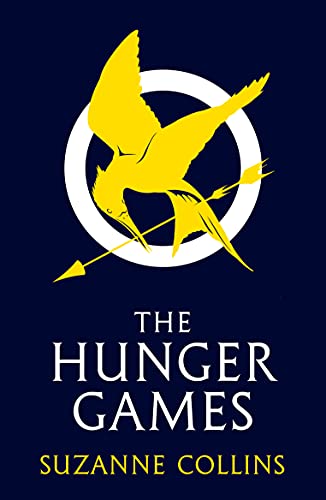
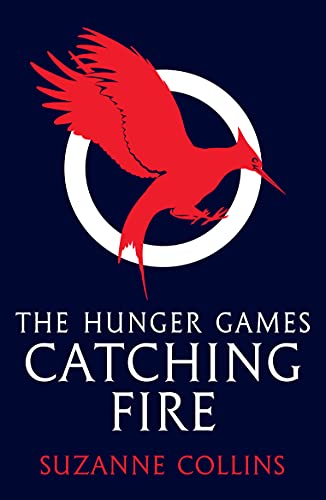


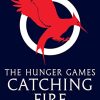
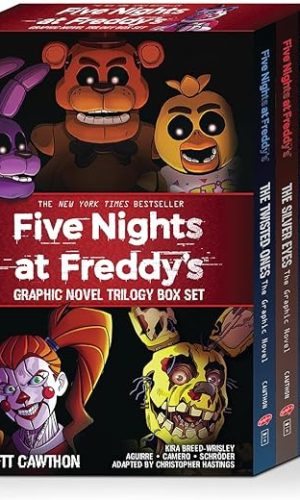


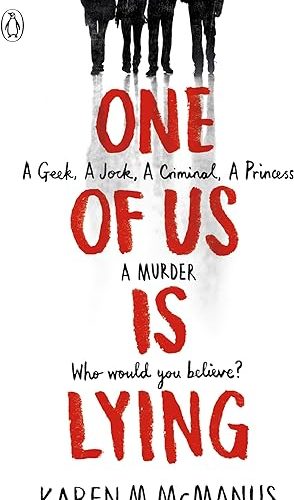
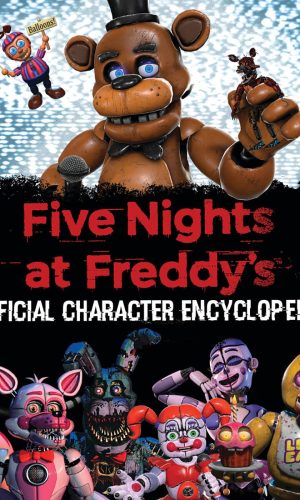
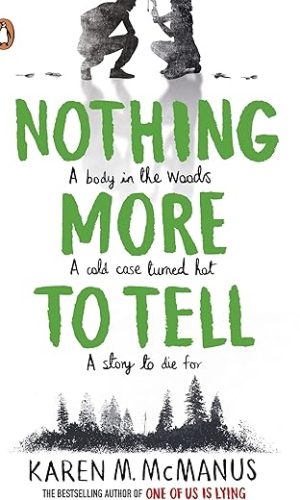
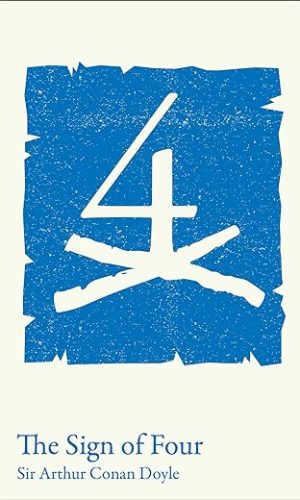
by Mark Newton
Could not put these books down, great read
by Tracey Madeley
The story begins with the reaping and Katniss volunteering to take her sister’s place. Written in the first person singular we know her thoughts, feelings and motivations. “How could I leave Priim, who is the only person in the world I’m certain I love?”
Like many dystopian novels this world is ruled by an oppressive regime which seeks to remind their citizens of the price of rebellion. Every year they take a boy and a girl from each district to fight in the gladiatorial arena. The leader is this regime is President Snow, an ironic name given that he is anything but pure in his motives. His symbol appears to be genetically modified white rose, heavy in its perfume it disguises the smell of blood, caused by the poison he made his enemies drink over the years. Almost like a sinister and benevolent Stalin, who rids himself of the competition, not quite the night of the long knives, but just as deadly.
The subsequent books in the series give more detail about the rebellion. There is the presumed destruction and abandonment of district 13, now the rebel base. The Quarter Quell where victors of the games compete in a special anniversary tournament. At first I felt this was merely a repetition of the themes of the first book, but it soon becomes clear these games are less of a competition and more about working together in support of the rebellion.
When the force field surrounding the arena is destroyed Katniss and her allies are rescued, but Peter is captured and tortured by the Capitol. Used in their propaganda war, his mind is manipulated so much that he no longer knows what is real. When he is rescued he becomes a liability, even trying to kill Katniss. Eventually the balance of his mind does return, but you do feel he’ll be forever scarred.
I find the ending a little awkward. I understand Katniss’s reasoning that the rebel leader may have been complicit in her sister’s death, but I would have liked some more certainty. The idea of her being with Peeta and not Gale also seems wrong. In the beginning of the first book she declares, “There’s never been anything romantic between Gale and me.” She admits to being jealous when other girls find him attractive, “but not for the reason people would think. Good hunting partners are hard to find.” You almost feel she is in denial and that she does like him more than she can admit to herself. When Gale is flogged she is distraught and they have to cover this up by saying he is her cousin. When Peeta is hit by the force field and Finnick saves his life she is equally distraught and grateful.
The limitation of first person narrative is that we have to see other characters through the eyes of the one person telling the story. This means that we have to interpret them through their eyes. Haymitch is shown as nothing but a drunk initially, but as the story progresses we learn far more about him and how much he cares. All his gifts in the arena, in the first book are for Katniss, even when he sends medicine for Peeta, it is Katniss he sends it to. The citizens of the Capitol come across as dizzy and shallow, but not cruel. Theirs is a fanciful, blind indoctrination based on ignorance. Plutarch being a notable exception, he carries the mockingjay symbol on his watch, as a sign of his support for the rebellion.
by Marcus B
The Hunger Games had been one of those books I’d been meaning to read for years but had never got around to it. Until one day, the whole trilogy was on Kindle’s Daily Deal so I decided to snap it up.
Unfortunately, for whatever reason, I didn’t enjoy it as much as I thought I would. I suppose that being 37 and having skipped most of the Young Adult/Teen fiction when I was a teenager myself (I was reading Stephen King and the like by the time I was 13), I wasn’t used to the easier style and the teen angst Katniss showcases through out the series.
The first book was very good but Catching Fire and Mockingjay were a bit dull. I even had to take a two month break between Catching Fire and Mockingjay. But there’s something about leaving a book on 75% complete that triggers my OCD so I decided to crack on with it and wrap it up and not just throw it on my “did not finish” pile.
I didn’t find Katniss a very likeable character with her attitude to Peeta and constantly throwing him under a Capitol bus, I mean sure she had a hard life but that doesn’t excuse the way she treated him, especially in Mockingjay when he needed help to beat the Capitol’s torture. About the only character I could relate to was Heymitch (minus the alcoholism!).
Even though I didn’t enjoy it, I don’t believe in giving a book one star. So I’ll give this three on the strength of the first in the trilogy.
It’s not that it’s a bad book trilogy by any means, it just didn’t connect with me. I suppose it’s comparable to someone reading Harry Potter for the first time ever at 40 and having not seen the films – it wouldn’t feel the same way to someone who’s grown up with the series from an early age.
by Jagger
Perfect for gift
by N. Walton
I don’t usually read “teen fiction”, I’m more of a sci-fi fan. However this trilogy was on sale at christmas, and I needed some books to tide me over for a holiday, so I thought “what the heck”. I have to admit, I felt a little sheepish admitting that I was reading “The Hunger Games” to my wife and her parents.
I was intrigued by the beginning, and the book really started to pull me in. And then the rather unpleasantness of the games themselves kicked in. I found it very hard to suspend disbelief at first, and my only thought was “how could they make this into a movie!? Nobody would want to see kids being slaughtered! It’s inhumane!”. I’ve still not seen the movies, and I have no intention of it.
However, once you move past the games themselves, the story of a dystopian future, where the remains of the USA are being controlled by a faction, and kept underfoot by money and power doesn’t seem so unlikely. The imbalance between coast and inland, or north and south is already there to some degree. It would only take a food shortage or insurrecton to tip the scales a little. The books take a wee while to get round to explaining how the world got to where it was, so at first I felt that the author had just create a parallel world in order to show off kids being killed.
However, once the setup is explained, and the various things that happened beforehand are made clear, it becomes all too possible that a massive imbalance in power would be possible, and would probably stir these resentments. If you look past the book, and study the political causality, and social effect, you find a story which is told many times over: Cruel oppressor, and victimized oppressed.
So, in summary, At first, I was shocked, apalled and had a hard time getting over the games themselves. But once I’d made it through, and the books start to hit their stride, they tell of a powerful, dangerous possibility, which we must be wary to avoid taking steps towards. By the last book, I found myself unable to put it down, and was thoroughly shocked by the brutality of the ending. I give it four stars because I found the subject matter made me very uncomfortable, which was probably the point, but by book 3, I think the author got a bit too gratuitous and spoiled it a bit.